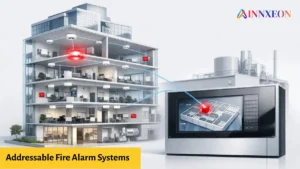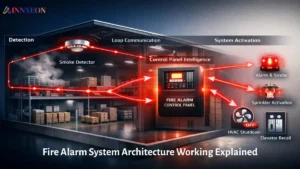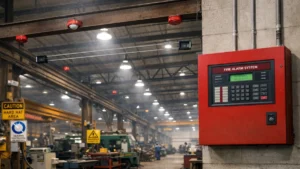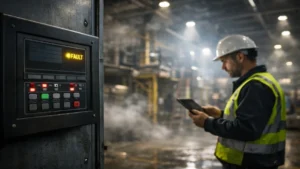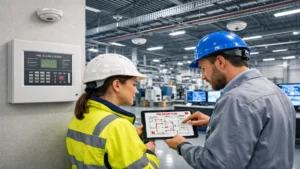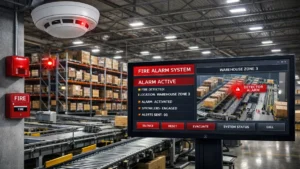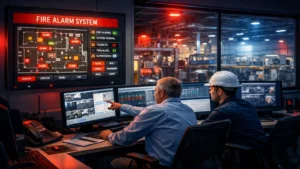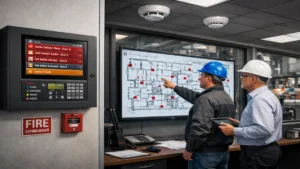In industrial environments, safety isn’t an option, it’s a requirement. Whether it’s a power plant, refinery, manufacturing unit or logistics hub, the risk of fire can have devastating consequences. Fire Safety Engineers responsible for these critical infrastructures need fire alarm systems that are not only dependable but also scalable, intelligent and compliant with international standards.
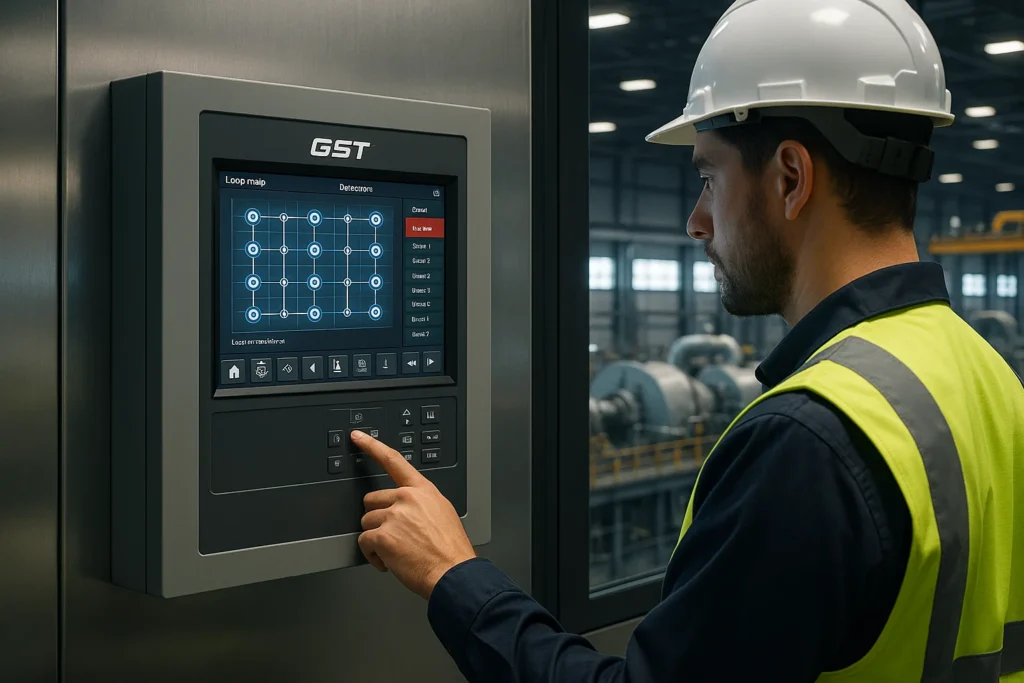
That’s where GST Fire Alarm Panels come into the picture. Known for their cutting-edge design, flexibility and robust performance, GST panels have become the first choice for engineers across industries in 2025. From smart addressable systems to advanced integration capabilities, GST ensures that engineers can design fire detection systems that work seamlessly even in the most demanding industrial conditions.
1. Built for Industrial-Grade Reliability
Industrial facilities operate under harsh conditions, heat, dust, humidity and continuous vibration. Regular fire systems often struggle to maintain accuracy in such environments.
GST Fire Alarm Panels are engineered for industrial reliability, offering stable operation even in challenging surroundings. The panels are built using high-grade electronic components with surge and noise protection, ensuring uninterrupted performance.
Engineers prefer GST because:
- They provide stable detection accuracy even under electromagnetic interference.
- The system maintains consistent communication across large networks.
- The panels are certified under global standards like EN54, LPCB and CCCF.
This level of reliability allows engineers to confidently deploy GST panels in heavy industries such as oil & gas, power generation, manufacturing and data centres.
2. Addressable Technology: Precision and Control
Traditional fire alarm systems can be slow to locate the exact source of a fire, leading to costly delays in response. GST’s addressable fire alarm panels solve this issue through smart detection and identification.
Each device in the GST addressable loop, whether a smoke detector, heat sensor or manual call point, has a unique address. When an alarm is triggered, the system instantly identifies the exact location of the incident.
For engineers, this offers three major advantages:
- Faster Response Time: Quick pinpointing of fire origin.
- Reduced Downtime: Early intervention minimizes equipment loss.
- Simplified Maintenance: Faults can be located instantly, reducing inspection time.
The result is enhanced situational awareness and a more reliable protection network across the facility.
3. Scalable Design for Large Industrial Sites
Industrial complexes are vast and often spread across multiple zones or buildings. Scalability is a critical factor for engineers during system design.
GST’s range of fire alarm panels, such as the GST200N, IFP8 and GST5000, are designed with scalability in mind. They can handle multiple loops, allowing connection of thousands of devices without compromising speed or reliability.
Engineers can easily expand the system as the facility grows, thanks to:
- Modular system architecture that supports loop expansion.
- Networking capability to interconnect multiple panels.
- Centralized monitoring software (GSTDefender) for complete control.
This flexibility makes GST a preferred choice for industrial zones, smart factories and multi-building projects.
4. Seamless Integration with Other Safety Systems
Modern industrial safety relies on system integration. Fire detection, suppression, access control, CCTV and BMS (Building Management Systems) must work together to ensure comprehensive protection.
GST Fire Alarm Panels are designed for seamless integration with third-party systems through open protocols and interfaces. Engineers can link GST panels with:
- FM200 / CO₂ gas suppression systems
- HVAC and electrical control systems
- Public address and voice evacuation systems
- Building Management Systems (BMS)
With RS485, Modbus and TCP/IP communication options, GST enables centralized safety monitoring and automation. Engineers benefit from simplified system management and coordinated emergency response across the entire facility.
5. Intelligent Monitoring and Remote Control
In the age of Industry 4.0, remote supervision is essential. GST’s latest fire alarm panels come with smart monitoring capabilities that enable real-time supervision, fault analysis and event logging.
Engineers can access system status remotely via GSTDefender or networked fire monitoring software, offering:
- Live data visualization of all connected devices.
- Instant fault and alarm notifications via network alerts.
- Comprehensive event history logs for audits and compliance.
This level of intelligence reduces the need for manual inspections and allows proactive maintenance, something engineers value highly in large-scale operations.
6. Cost Efficiency Without Compromise
Industrial fire systems are major investments and cost efficiency is always a deciding factor. GST Fire Alarm Panels deliver value for money by combining performance, scalability and longevity.
Key cost-saving advantages include:
- Lower installation costs due to simplified wiring in addressable systems.
- Reduced maintenance time through easy device identification.
- Energy-efficient operation with intelligent device sleep/wake modes.
- Long product lifecycle, ensuring sustainable investment.
Engineers appreciate that GST offers high-end reliability at competitive pricing, making it one of the most cost-effective solutions in the market.
7. User-Friendly Interface and Configuration
Complexity can be a barrier in large-scale installations. GST panels feature an intuitive user interface that allows engineers and technicians to configure, monitor and test systems without specialized programming skills.
Features that enhance usability include:
- LCD touch or keypad displays for real-time data.
- Menu-driven configuration tools for easy setup.
- Built-in diagnostic functions for quick troubleshooting.
This not only reduces commissioning time but also minimizes the need for extensive training, important when multiple teams are involved in project execution.
8. Global Certifications and Compliance
Industrial engineers often work on projects that require international safety compliance. GST panels are globally recognized and certified, giving them a strong reputation for quality and reliability.
They meet stringent standards like:
- EN54 (European Standard)
- LPCB (UK Certification)
- UL / CCCF (China Fire Standards)
- Civil Defense Approvals in GCC countries
These certifications make GST panels suitable for multinational industrial projects, ensuring they comply with both local and international regulations.
9. Trusted by Engineers Worldwide
GST, a brand under Gulf Security Technology, has over two decades of experience in fire safety innovation. Its panels and devices are deployed across more than 100 countries, protecting industries ranging from oil & gas and manufacturing to airports and hospitals.
Engineers trust GST because of:
- Proven track record in industrial safety.
- Strong after-sales support and service network.
- Availability of spare parts and technical assistance.
This global trust reinforces why GST is not just a system, it’s a long-term safety partner for industrial engineers.
10. Real-World Industrial Success Stories
To understand GST’s real impact, consider a few examples:
- Power Plant Application: GST Addressable Panels have protected 200 MW plants by preventing downtime through instant fault isolation.
- Refinery Projects: In explosive zones, GST systems integrate with gas suppression modules for layered safety.
- Solar Control Rooms: Engineers deploy GST systems for noise-free operation and reliable fire detection in high-temperature control environments.
These practical results demonstrate how GST delivers safety, continuity and reliability, three pillars every engineer looks for in industrial applications.
11. Comprehensive Product Range for Every Project
GST doesn’t follow a one-size-fits-all approach. Engineers can choose from a wide range of panels based on project requirements:
| Model | Type | Ideal Use Case |
|---|---|---|
| GST100 Series | Conventional | Small industrial zones and warehouses |
| GST200N Series | Addressable | Mid-size factories, logistics and manufacturing units |
| IFP4E / IFP8 Series | Intelligent Addressable | Large plants, refineries and multi-building projects |
| GST5000 | Networkable Intelligent | Large-scale industrial or mixed-use developments |
This flexibility ensures that every industrial project from a single plant room to a massive production campus, can find a perfectly matched GST solution.
12. The Engineer’s Advantage: Simplified Design and Reliable Operation
Ultimately, GST fire alarm panels give engineers an edge. With user-friendly software, open communication protocols and reliable field devices, they simplify every stage of the project, design, installation and maintenance.
Engineers can easily:
- Design system layouts using GST CAD tools.
- Simulate fire events to test performance.
- Perform loop mapping and device addressing efficiently.
In high-stakes industrial projects, these advantages translate to reduced commissioning time, fewer site issues and better long-term reliability.
GST – The Industrial Standard in Fire Safety
When it comes to industrial fire protection, engineers prioritize performance, flexibility and reliability, and GST Fire Alarm Panels deliver all three.
Their intelligent design, global certifications and integration capabilities make them the go-to choice for industrial engineers who refuse to compromise on safety. Whether it’s a refinery, a solar control room, or a power station, GST panels stand as a trusted backbone of industrial fire protection systems worldwide.
Read Also: Top 10 Site Issues Fire Engineers Face (and How GST Panels Fix Them)
Read Also: How GST’s Addressable Fire System Prevented Downtime in a 200 MW Power Plant

